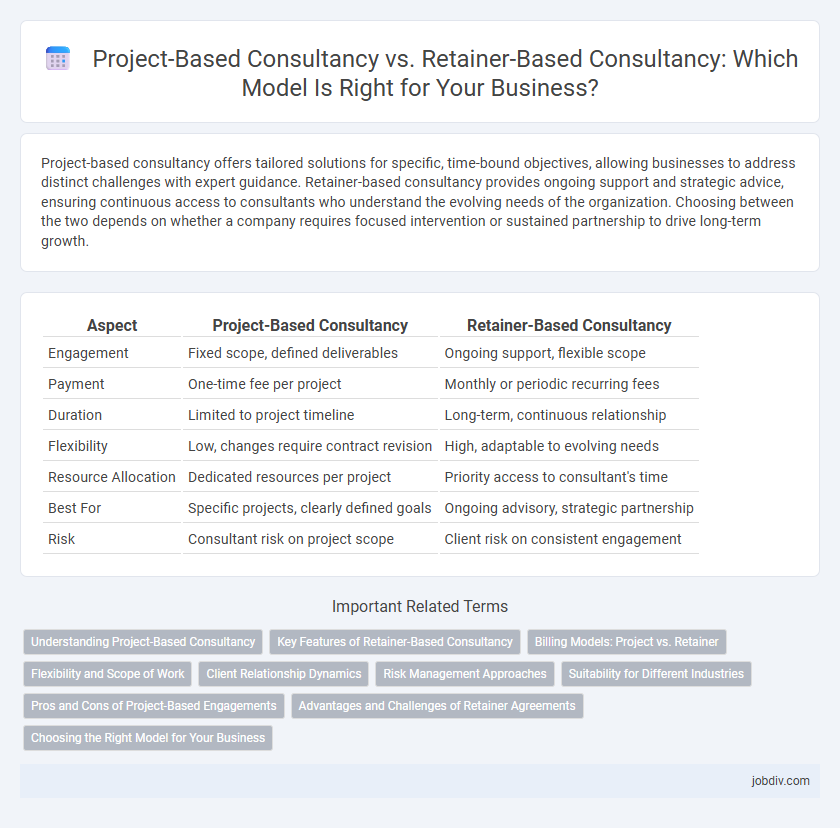Project-based consultancy offers tailored solutions for specific, time-bound objectives, allowing businesses to address distinct challenges with expert guidance. Retainer-based consultancy provides ongoing support and strategic advice, ensuring continuous access to consultants who understand the evolving needs of the organization. Choosing between the two depends on whether a company requires focused intervention or sustained partnership to drive long-term growth.
Table of Comparison
| Aspect | Project-Based Consultancy | Retainer-Based Consultancy |
|---|---|---|
| Engagement | Fixed scope, defined deliverables | Ongoing support, flexible scope |
| Payment | One-time fee per project | Monthly or periodic recurring fees |
| Duration | Limited to project timeline | Long-term, continuous relationship |
| Flexibility | Low, changes require contract revision | High, adaptable to evolving needs |
| Resource Allocation | Dedicated resources per project | Priority access to consultant's time |
| Best For | Specific projects, clearly defined goals | Ongoing advisory, strategic partnership |
| Risk | Consultant risk on project scope | Client risk on consistent engagement |
Understanding Project-Based Consultancy
Project-Based Consultancy involves clients hiring consultants to complete specific tasks or projects with clearly defined objectives, timelines, and deliverables. This model emphasizes outcome-driven work, where fees are typically fixed or milestone-based, providing clarity and control over budget and scope. Project-Based Consultancy suits businesses seeking targeted expertise for discrete challenges without ongoing commitment.
Key Features of Retainer-Based Consultancy
Retainer-based consultancy offers continuous access to expert advice and support through a fixed monthly fee, ensuring long-term strategic alignment and proactive problem-solving. This model prioritizes relationship building, anticipates client needs, and enables consultants to provide tailored solutions with consistent availability. Financially, it guarantees predictable revenue for consultants while offering clients budget stability and prioritized service delivery.
Billing Models: Project vs. Retainer
Project-based consultancy billing involves a fixed fee or milestone payments tied to specific deliverables, providing clear cost expectations and scope control for clients. Retainer-based consultancy billing requires clients to pay a recurring fee, often monthly, ensuring continuous access to consultancy services and fostering long-term advisory relationships. The choice between these models hinges on whether clients need one-off solutions with defined outcomes or ongoing strategic support and flexibility.
Flexibility and Scope of Work
Project-based consultancy offers high flexibility by allowing clients to define specific deliverables and timelines, ideal for short-term or clearly outlined tasks. Retainer-based consultancy provides a broader scope of work with ongoing support, enabling continuous access to expertise and adaptability to evolving business needs. Choosing between these models depends on whether a client requires targeted outcomes or sustained advisory services over time.
Client Relationship Dynamics
Project-based consultancy typically involves a finite scope with defined deliverables, fostering a transactional client relationship centered on specific outcomes and timelines. Retainer-based consultancy cultivates an ongoing partnership, enabling continuous advisory support that adapts to evolving client needs and promotes long-term strategic alignment. Client relationship dynamics in retainers emphasize trust, flexibility, and proactive engagement, whereas project-based models prioritize efficiency, clarity, and milestone achievements.
Risk Management Approaches
Project-based consultancy involves risk assessment tailored to specific deliverables and timelines, ensuring risks are identified and mitigated within defined project scopes. Retainer-based consultancy emphasizes continuous risk management through ongoing monitoring and adaptive strategies, enabling proactive responses to evolving challenges. The choice between these approaches depends on a client's need for either focused, short-term risk mitigation or sustained, dynamic risk control.
Suitability for Different Industries
Project-based consultancy suits industries with clearly defined, short-term goals such as construction, IT implementation, and marketing campaigns. Retainer-based consultancy benefits sectors requiring ongoing support and strategic guidance, including legal services, financial advisory, and healthcare management. Selecting the appropriate consultancy model relies on the industry's need for either episodic expertise or continuous collaboration.
Pros and Cons of Project-Based Engagements
Project-based consultancy offers clear deliverables and defined timelines, enabling clients to budget precisely and evaluate outcomes against specific objectives. However, its limited scope can restrict ongoing support and flexibility, potentially leading to gaps in addressing evolving business needs. The transactional nature often results in higher short-term costs compared to retainer models that provide continuous advisory services.
Advantages and Challenges of Retainer Agreements
Retainer-based consultancy offers continuous access to expert advice, ensuring consistent support and proactive problem-solving that aligns with long-term business goals. It provides financial predictability and fosters a deeper consultant-client relationship, though challenges include managing expectations and justifying ongoing costs during periods of low activity. Businesses benefit from stable collaboration but must carefully structure retainer terms to balance workload and maintain value.
Choosing the Right Model for Your Business
Project-based consultancy offers businesses clear deliverables and defined timelines ideal for specific, short-term objectives, while retainer-based consultancy provides ongoing support and strategic advice essential for long-term growth and adaptability. Selecting the right model depends on factors such as project complexity, budget constraints, and the need for continuous expert guidance. Businesses aiming for flexibility and targeted outcomes often prefer project-based services, whereas those seeking sustained collaboration benefit more from retainer agreements.
Project-Based Consultancy vs Retainer-Based Consultancy Infographic

 jobdiv.com
jobdiv.com